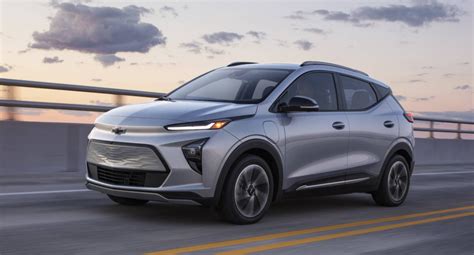Chevrolet has announced that their latest model of electric vehicle, the Chevy Bolt, will see a major price cut in 2023. This is great news for those who are in the market for a new electric vehicle, as it means that the cost of owning one could become much more affordable.
The current model of the Chevrolet Bolt has a manufacturer’s suggested retail price of $37,495. That is certainly a significant amount of money, but the good news is that the price is set to drop drastically in the near future. According to Chevrolet, the 2023 Bolt will only cost $27,595, which is a savings of $10,000. This makes it one of the most affordable electric vehicles available on the market today.
In addition to the lower price, the 2023 Chevrolet Bolt will also feature several upgrades. These include improved performance, a longer range of up to 259 miles per charge, and a more refined interior design. This means that it will be an even better value in the long run, as it will be able to go further on less energy and provide a more comfortable ride.
The 2023 model of the Chevy Bolt will also be compatible with a range of charging systems, including the Chevrolet EV Charging Network. This network will provide drivers with access to more than 10,000 public charging locations throughout the United States. This will make it much easier to charge up the Bolt, no matter where you are.
The 2023 Chevrolet Bolt is set to be one of the most affordable electric vehicles on the market. With a significant price cut and a range of new features, it is sure to be a great option for those who are looking to switch from a traditional gasoline-powered car. The Bolt will be available in 2023, so be sure to keep an eye out for when it hits the market.
What The Chevy Bolt Will Cost In 2023: A Primer
The Chevy Bolt is a popular electric vehicle on the market that has created waves in the industry. For those looking to purchase a Chevy Bolt in 2023, the cost may be a bit of a mystery. Here’s a primer on what the Bolt will cost in 2023.
As of now, the Bolt’s MSRP ranges from $36,620 – $41,620. This cost will not necessarily change in 2023, as the MSRP is usually relatively consistent. However, the cost of the Bolt – or any car for that matter – can be affected by things like demand, availability, and discounts or incentives.
In addition, the cost of the Bolt can be affected by the type of battery it has. The Bolt comes with two battery options – the Extended Range Battery and the Long Range Battery. The Extended Range Battery has a range of 259 miles per charge, while the Long Range Battery has a range of up to 383 miles per charge. The Extended Range Battery is cheaper, while the Long Range Battery is more expensive.
In addition, the Bolt may come with some incentives or discounts in 2023. For example, some states may offer incentives, such as tax rebates or discounts on registration fees, for buying an electric vehicle. These incentives vary from state to state, so it’s important to research local laws and regulations to see what incentives are available in your area.
The cost of the Bolt will also be affected by the type of trim you choose. The Bolt is available in three trims – the LT, Premier, and Elite. The LT is the base model, with the Premier and Elite having more features and amenities. The cost of the Bolt will increase as you move up in trim level.
Finally, the cost of the Bolt can also be affected by dealer fees and taxes. Dealer fees can vary greatly from dealer to dealer, so it’s important to shop around for the best deal. Taxes also vary by state and local regulations, so be sure to research local laws to find out what taxes may apply to your purchase.
In summary, the cost of the Chevy Bolt in 2023 will depend on a variety of factors, such as the type of battery, trim level, incentives or discounts, and taxes and fees. It’s important to research these factors prior to purchasing to find the best deal.
Chevy Bolt Savings In 2023: A Comprehensive Analysis
The Chevy Bolt is a revolutionary electric vehicle that has made waves in the automotive industry since its release in 2017. The Bolt offers a great combination of performance, range, and affordability that has made it the top-selling EV in the US. But with its rising popularity, many consumers are curious about how much the Chevy Bolt will save them in the long run.
To answer this question, we have put together a comprehensive analysis of the Chevy Bolt’s potential savings in 2023. We considered factors such as fuel efficiency, maintenance costs, and initial purchase price to determine the overall savings potential.
The Chevy Bolt has impressive fuel efficiency ratings, with an estimated range of up to 259 miles on a single charge. This means it can go up to 244 miles on a single gallon of gas, which is significantly better than most gasoline-powered vehicles. Additionally, the Bolt is eligible for a federal tax credit of up to $7,500, which further reduces its cost.
The Chevy Bolt’s maintenance costs are also much lower than those of gasoline-powered vehicles. Since the Bolt does not have an engine, transmission, or other moving parts, there are fewer parts that need to be maintained. Additionally, the Bolt has fewer fluids and filters that need to be replaced, resulting in lower maintenance costs overall.
The initial purchase price of the Bolt is also lower than most gasoline-powered vehicles. The Bolt starts at $37,495, which is significantly lower than most gas-powered cars in its class. Additionally, the Bolt is eligible for a federal tax credit of up to $7,500, which further reduces its cost.
When all factors are taken into consideration, the Chevy Bolt has the potential to save consumers up to $9,500 in 2023. This includes the initial purchase price, fuel efficiency, and maintenance costs. Additionally, the Bolt is eligible for a federal tax credit of up to $7,500, which further reduces its cost.
The Chevy Bolt is an excellent choice for those looking to save money in the long run. With its impressive fuel efficiency, lower maintenance costs, and initial purchase price, the Bolt has the potential to save up to $9,500 in 2023. Additionally, the Bolt is eligible for a federal tax credit of up to $7,500, which further reduces its cost. All things considered, the Chevy Bolt is one of the most cost-effective electric vehicles on the market today.
The estimated cost of the Chevy Bolt in 2023 is not yet available.
The Chevy Bolt is expected to be highly efficient, with a range of up to 259 miles on a single charge.
The Chevy Bolt will be available with a wide range of safety features, including automated emergency braking, lane departure warning, rear cross-traffic alert, and more.
The Chevy Bolt uses a combination of Level 1 charging (120V) and Level 2 charging (240V) to provide the fastest charging times.
The Chevy Bolt comes with a 3-year/36,000-mile limited warranty and 5-year/60,000-mile powertrain warranty.
No, the Chevy Bolt is not available with an all wheel drive option.
The Chevy Bolt uses a 60 kWh lithium-ion battery for power.
The Chevy Bolt has a range of up to 259 miles on a single charge.
No, the Chevy Bolt is not allowed to be modified in any way, as doing so may void the vehicle’s warranty.
Yes, the Chevy Bolt comes with a range of standard features, such as an 8-inch touchscreen display, Apple CarPlay/Android Auto, and air conditioning.






